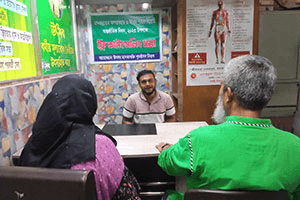 April 16, 2024 0 Comment
April 16, 2024 0 Comment In the bustling city of Dhaka, amidst its vibrant culture and thriving community, lies a sobering reality – the pervasive issue of drug addiction. While the fight against drug abuse requires a multifaceted approach, one often overlooked yet crucial aspect is family counseling. In the journey towards recovery, the support and involvement of family members can make all the difference, through drug addiction treatment transforming lives and fostering lasting change is possible.
Family counseling serves as a cornerstone in drug addiction treatment for several compelling reasons. Firstly, it acknowledges the interconnectedness of familial relationships and substance abuse. Drug addiction not only impacts the individual but reverberates through the entire family unit, causing emotional turmoil, strained relationships, and a breakdown in trust. By involving family members in counseling sessions, therapists can address underlying family dynamics, communication barriers, and dysfunctional patterns that may contribute to or exacerbate addiction.
Moreover, family counseling provides a supportive environment for both the individual struggling with addiction and their loved ones. It offers a safe space for open dialogue, where concerns, fears, and frustrations can be expressed without judgment. Through guided discussions and therapeutic interventions, families learn to communicate effectively, rebuild trust, and set healthy boundaries, essential components for a successful recovery journey.
Additionally, family counseling helps educate loved ones about addiction, its complexities, and the role they can play in the recovery process. Many family members may harbor misconceptions or stigmatizing beliefs about addiction, leading to feelings of guilt, shame, or helplessness. By fostering understanding and empathy, counseling empowers families to become active agents of support, rather than enablers or adversaries.
In the context of drug addiction treatment in Dhaka, where cultural norms and societal pressures may influence familial dynamics, family counseling becomes even more imperative. Traditional values of honor, respect, and family unity can both hinder and facilitate the recovery process. Therapists trained in culturally sensitive approaches can navigate these complexities, bridging the gap between tradition and modern addiction treatment methodologies.
Furthermore, family counseling extends beyond the confines of therapy sessions, promoting ongoing support and accountability within the family network. Through group therapy, family workshops, and aftercare programs, families continue to strengthen their bonds and reinforce positive behaviors, reducing the risk of relapse and promoting long-term recovery.
In Dhaka, where resources for addiction treatment may be limited, integrating family counseling into existing rehabilitation programs is not just beneficial but essential. By harnessing the power of familial relationships, counselors can cultivate a supportive ecosystem that nurtures hope, resilience, and healing. As Dhaka confronts the challenges of drug addiction, let us recognize the pivotal role of family counseling in shaping a brighter, drug-free future for individuals and communities alike.
